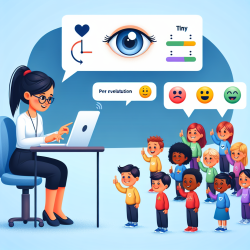In the field of speech-language pathology, understanding how children respond to feedback can significantly influence therapeutic outcomes. A recent study titled Children’s Feedback Preferences in Response to an Experimentally Manipulated Peer Evaluation Outcome: The Role of Depressive Symptoms provides valuable insights into how depressive symptoms affect children's feedback preferences. This research can help practitioners tailor their feedback strategies to better support children, particularly those with elevated depressive symptoms.
The study involved 142 children aged 10 to 13, who participated in a computer contest based on the television show Survivor. They were randomized into three groups: peer rejection, peer success, and a control condition. The children’s feedback preferences were then assessed, revealing key findings:
- Children assigned to the negative evaluation outcome showed a higher preference for negatively tuned feedback.
- Contrary to self-verification theory, children with higher depressive symptoms preferred negative feedback only in response to negative peer evaluation outcomes.
- These preferences were not influenced by the children's baseline mood or mood changes due to feedback manipulation.
For practitioners, these findings underscore the importance of considering a child's emotional state and feedback preferences when designing therapeutic interventions. Here are some practical applications:
1. Tailoring Feedback Based on Evaluation Outcomes
Children's preference for feedback varies depending on whether they experience success or rejection. Practitioners should:
- Provide balanced feedback that includes both positive and constructive elements, especially for children who have faced negative peer evaluations.
- Monitor the child's response to feedback and adjust the approach accordingly to maintain engagement and motivation.
2. Addressing Depressive Symptoms
Children with elevated depressive symptoms may require different feedback strategies. Practitioners should:
- Be aware that these children might seek negative feedback to confirm their self-perceptions, particularly after negative experiences.
- Encourage positive self-reflection and gradually introduce more positive feedback to help shift their self-perception.
3. Conducting Further Research
This study highlights the need for further research into feedback preferences and depressive symptoms in children. Practitioners can contribute by:
- Collecting data on their own clients' feedback preferences and outcomes.
- Collaborating with researchers to explore new therapeutic approaches based on these insights.
In conclusion, integrating the findings from this study into your practice can enhance your ability to support children effectively, particularly those with depressive symptoms. Tailoring feedback to match children's preferences and emotional states can foster better therapeutic outcomes.
To read the original research paper, please follow this link: Children’s Feedback Preferences in Response to an Experimentally Manipulated Peer Evaluation Outcome: The Role of Depressive Symptoms.










